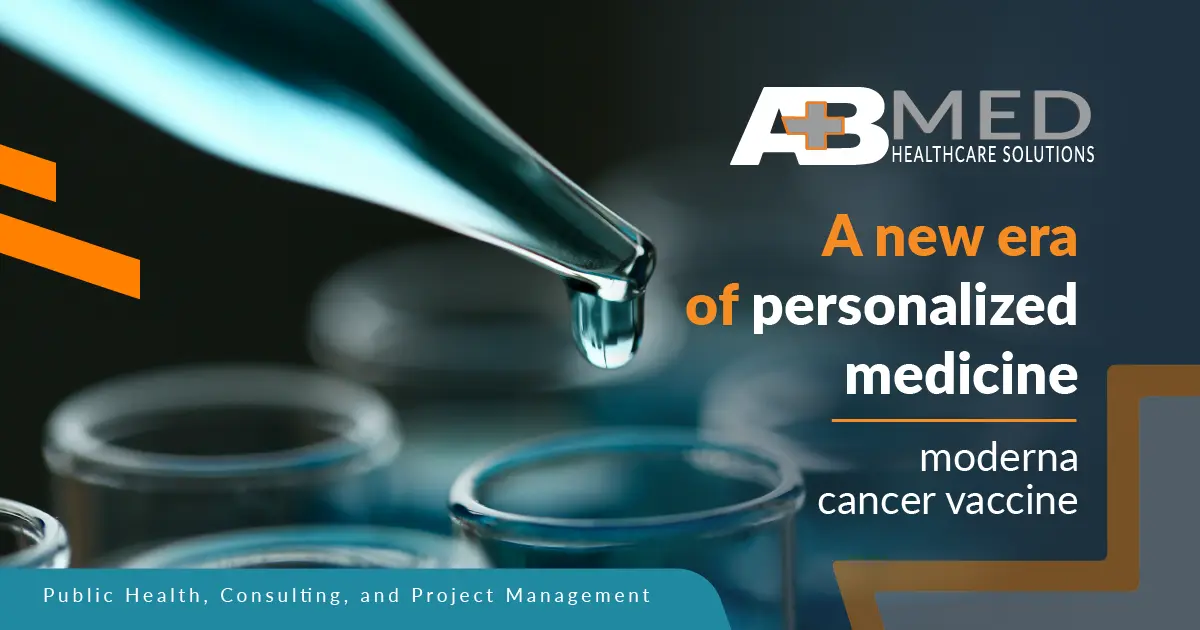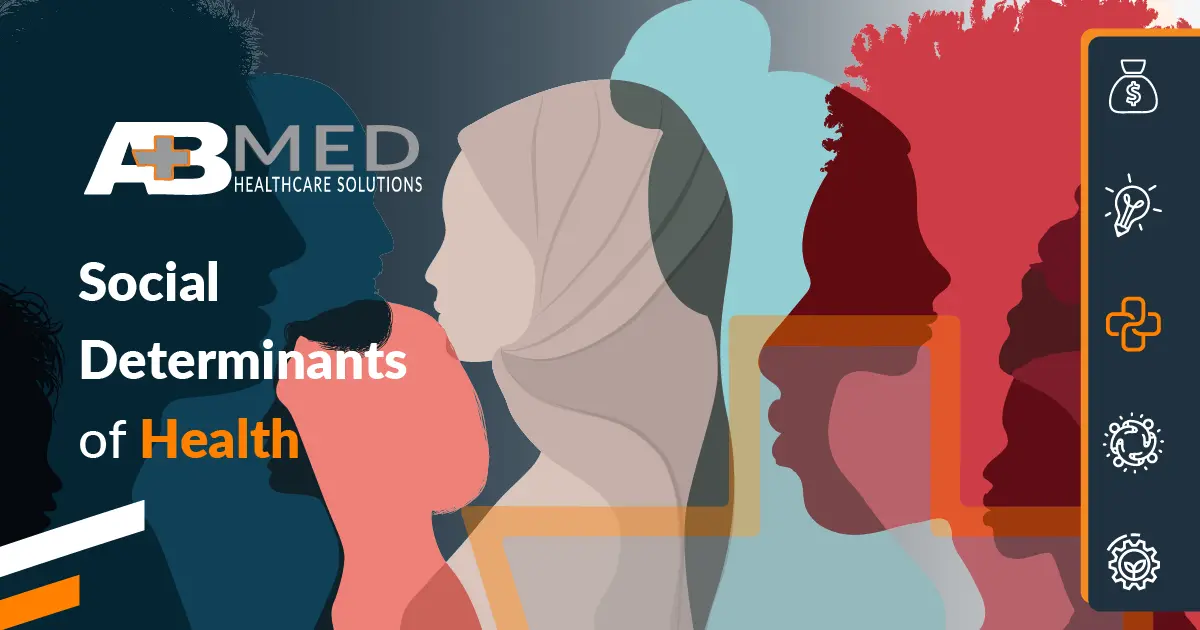Recent news of Moderna’s experimental melanoma vaccine has drawn attention to the promise of personalized medicine in the medical community. While the idea of personalized or precision medicine has been around for years, new encouraging trials—like Moderna’s experimental cancer vaccine—are highlighting just how revolutionary personalized medicine can be.
This article will explore how personalized medicine has the potential to change the course of public health and the healthcare landscape overall. We will explain what personalized medicine is, what it could look like in practice (I.e., Moderna’s melanoma vaccine), and how it can advance and improve public health globally.
What Is Personalized Medicine?
Medical care in the U.S. has often been described as “one-size-fits-all” when it comes to treating and preventing disease. Personalized medicine, on the other hand, aims to take a more tailored approach.
According to the National Institutes of Health, “Personalized medicine is an emerging practice of medicine that uses an individual’s genetic profile to guide decisions made in regard to the prevention, diagnosis, and treatment of disease.” [i]
Issam Zineh, Director of the FDA’s Office of Clinical Pharmacology, explains personalized medicine this way: “Personalized medicine has a fairly broad definition, but, essentially, we’re talking about using genetic or other biomarker information to make treatment decisions about patients. These could include decisions about who should get certain kinds of therapies or specific doses of a given therapy, or who should be monitored more carefully because they’re predisposed to a particular safety issue.” [ii]
So how might this concept of personalized medicine play out in practice? Let’s explore Moderna’s new promising melanoma vaccine.
Moderna Cancer Vaccine
First off, it’s important to note that Moderna’s experimental vaccine doesn’t prevent melanoma; it’s instead designed to treat it. [iii] How? Through the creation of a tailor-made vaccine for each patient based on their specific genes and their specific tumor.
Dr. Mark O’Brian, Professor and Chair of Biochemistry at the University of Buffalo, explains how these vaccines work: “Each tumor is unique, and so the vaccine needs to be unique as well. To customize vaccines, researchers first biopsy the patient’s tumor to determine what neoantigens are present. The vaccine manufacturer then designs specific mRNA molecules that encode those neoantigens. When this custom mRNA vaccine is administered, the body translates the genetic material into proteins specific to the patient’s tumor, resulting in an immune response against the tumor.” [iii].
While the Moderna vaccine is still in the early phases of clinical trials, Dr. O’Brian went on to explain the incredible opportunity and promise of personalized disease treatment: “By understanding the molecular basis of diseases, researchers can explore how their underlying causes vary among people, and offer personalized therapeutic options against those diseases.” [iii]
The Moderna vaccine is just one example of the potential impact of personalized medicine. In the following section, we will explore a few different ways personalized medicine can change the public health landscape.

How Personalized Medicine Can Change Public Health
Personalized medicine has the potential to transform public health and health outcomes in incredible new ways. While not comprehensive, here are some of the top ways this new approach to medicine can make a difference.
Tailored Treatments
As previously explained through the Moderna cancer vaccine example, personalized medicine can help doctors develop unique treatment plans that are tailored to the specific patient in question.
A report published by the NCBI on precision medicine explains the problem with treatment plans that don’t take the individual patient into consideration: “Traditional medicine used a “one size fits all” approach…This approach, however, is laden with various problems like only a certain percentage of these patients would respond to the particular drug, a significant percentage would not respond, and another important subset would develop adverse effects. The reasons for these inter-individual differences could be genetic variations, age, gender, addictions, race, ethnicity, concomitant drugs, comorbidities, environmental factors, and so on.” [iv]
Alternatively, a personalized medical approach has the potential to lead to more effective treatments and fewer adverse effects.
Earlier Disease Detection and Prevention
Doctors and researchers are learning more and more about how genes play a role in the development of certain diseases. A more personalized approach to medicine could take these genetic differences into account and help identify individuals who are at high risk for certain diseases.
For example, research has shown that survival rates improve when cancer is detected early. Unfortunately, according to a report published by the NCBI, “~50% of cancers are at an advanced stage when diagnosed.” [v]
Personalized medicine could help doctors better identify what diseases a patient is most at risk for so that they can take the proper preventative steps. This would allow for earlier intervention and, ultimately, more effective treatment.
Improved Drug Development
Personalized medicine also has the potential to speed up and improve the drug development process by identifying individuals who are most likely to benefit from a particular medicine.
Dr. Issam Zineh explains some of the drawbacks of the current treatment approach: “there may not be any rationale for why you’re getting that particular medication other than that your insurance covers it or the doctor has samples available… We’ve learned that this trial-and-error approach leads to patient dissatisfaction, poor clinical outcomes, and greater expense, especially for chronic diseases.”
He then goes on to explain how personalized medicine can improve this approach: “Personalized medicine aims to streamline clinical decision making by using biological information available through a genetic test or biomarker, and then saying, “based on this profile, I think you’re more likely to respond to Drug A or Drug B, or less likely to have an adverse reaction with Drug C.” The idea is to get patients on the right medication and to get them on it sooner.”
A better understanding of what kinds of patients will respond well to what kinds of drugs can reduce the time and cost associated with clinical trials. This understanding can also help improve health outcomes since the trial-and-error approach can be minimized.
Overall, personalized medicine has the potential to significantly impact and advance public health and the healthcare landscape. Through earlier detection, tailored treatments, and streamlined drug development, we will continue to see how a personalized approach to care can revolutionize health and wellness. Let’s Connect.
REFERENCES & RESOURCES
- Genome.gov. (n.d.). Personalized Medicine. [online] Available at: https://www.genome.gov/genetics-glossary/Personalized-Medicine#:~:text=Personalized%20medicine%20is%20an%20emerging
- IResearch, C. for D.E. and (2019). Personalized medicine: A biological approach to patient treatment. FDA. [online] Available at: https://www.fda.gov/
- O’Brian, M.R. (n.d.). Moderna’s experimental cancer vaccine treats but doesn’t prevent melanoma – a biochemist explains how it works. [online] The Conversation. Available at: https://theconversation.com/modernas-experimental-cancer-vaccine-treats-but-doesnt-prevent-melanoma-a-biochemist-explains-how-it-works-197003 [Accessed 1 Mar. 2023].
- Naithani, N., Sinha, S., Misra, P., Vasudevan, B. and Sahu, R. (2021). Precision medicine: Concept and tools. Medical Journal Armed Forces India, 77(3), pp.249–257. doi:https://doi.org/10.1016/j.mjafi.2021.06.021
- Crosby, D., Bhatia, S., Brindle, K.M., Coussens, L.M., Dive, C., Emberton, M., Esener, S., Fitzgerald, R.C., Gambhir, S.S., Kuhn, P., Rebbeck, T.R. and Balasubramanian, S. (2022). Early detection of cancer. Science, 375(6586). doi: https://doi.org/10.1126/science.aay9040
By: Erik McLaughlin MD, MPH and Aikaterini Papadopoulou, B.Arch






